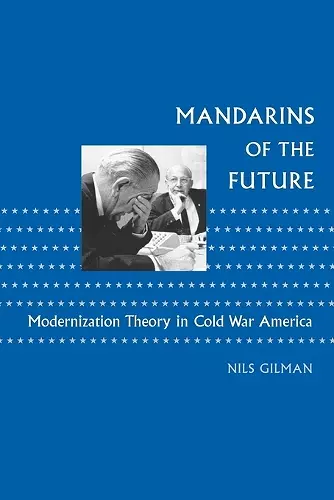Mandarins of the Future
Modernization Theory in Cold War America
Format:Paperback
Publisher:Johns Hopkins University Press
Published:30th Mar '07
Currently unavailable, and unfortunately no date known when it will be back

Although a number of important works have appeared in the last few years on modernization theory and American foreign policy in the 1960s, Mandarins of the Future will be definitive, perhaps for decades to come. Gilman provides not only the fullest history of modernization theory, and its linkages to actual government policy formation, but he explores in depth a fascinating slice of American intellectual history in the 1960s and early 1970s. His analysis of foundation and academic politics and their interface with government agencies is detailed, original and compelling. -- Michael Adas, Rutgers University The American engagement with 'modernization' is one of the most important episodes in the intellectual, political, and diplomatic history of the Cold War epoch, filled with cautionary tales for our own time. Gilman's sophisticated, clearly-argued, archive-based interpretation is a commanding contribution to our understanding of the terms on which the United States interacts with the rest of the world. -- David A. Hollinger, University of California, Berkeley
Because it provided the dominant framework for the "development" of poor, postcolonial countries, modernization theory ranks among the important constructs of twentieth-century social science. This title offers the intellectual history of a movement that has had far-reaching, and often unintended, consequences.Ideas about how to "modernize," particularly when developed countries apply them to countries less fortunate, clearly have consequences, intended and unintended. Modernization theory must be among the most important constructs of the twentieth century, certainly in the story of the social sciences. Nils Gilman here offers the first (or second) attempt to treat its development as a problem in intellectual history. The dimensions of the problem call for special ambition and competence, and Gilman has turned in a highly creditable performance. His study ranges from concepts of "modernism" to the post-World War II/Cold War American sense of global mission and responsibility. Gilman examines rising energy levels at the most prestigious university departments in the social sciences, with an entire chapter exploring Talcott Parsons and the Harvard social relations program and another on Walt Rostow and the attempt to rationalize foreign aid/foreign policy at MIT. Gilman thus supplies the background and context for the nation's "generous" Third World programs during the period of competition with the Soviet Union-and the same for our most grievous postwar blunder, the notion that our power and good intentions could save the South Vietnamese from poverty, themselves, and the post-colonialists to the north. "Nils Gilman effectively charts the development of "Modernization theory" in American intellectual life after World War II, examining the intstitutional networks that usstained it and helped make it a keystone of academic and foreign-policy discourse in the 1950s and early 1960s." --Howard Brick, Washington University, St. Louis "Gilman provides not only the fullest history of modernization theory, and its linkages to actual government policy formation, we have to date, but he explores in depth a fascinating slice of American intellectual history in the 1960s and early 1970s. His analysis of foundation and academic politics and their interface with government agencies is detailed, original and compelling...He also has some provocative things to say about its resurrection, however uncertain, following the collapse of commmand communism in Eastern Europe. ..No serieous author (or teacher) will be able to tackle this subject...
The detailed analysis and broad-ranging explorations in Mandarins of the Future will interest scholars and graduate students in a variety of areas. -- Johanna Bockman Journal of Cold War Studies 2006 Intellectual fashions come and go, and this well-researched book artfully analyzes the rise and fall of one of the more powerful paradigms in post-World War II American political science-so-called modernization theory. -- William B. Quandt Ethics and International Affairs Mandarins of the Future both helps us understand a past paradigm in its historical context and offers insights for those seeking to comprehend the social world of today. -- Daniel Geary Journal of the History of the Behavioral Sciences 2004 Gilman's analysis is original, well-researched, probing, and provocative. -- Walter Hixson American Historical Review 2006 The author carefully surveys and explains modernization theory and how it shaped the U.S. post-WWII foreign policy to contain Communism during the Cold War. Choice 2004 Development specialists and scholars of the academy... will welcome Gilman's attention to the nuances of academic debate. -- Deborah Kisatsky Journal of Interdisciplinary History 2007
ISBN: 9780801886331
Dimensions: 229mm x 152mm x 23mm
Weight: 522g
344 pages